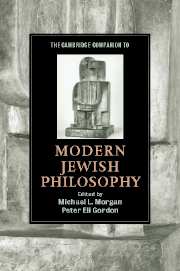Book contents
- Frontmatter
- 1 Introduction: Modern Jewish Philosophy, Modern Philosophy, and Modern Judaism
- 2 Baruch Spinoza and the Naturalization of Judaism
- 3 The Liberalism of Moses Mendelssohn
- 4 Jewish Philosophy after Kant The Legacy of Salomon Maimon
- 5 Hermann Cohen: Judaism and Critical Idealism
- 6 Self, Other, Text, God: The Dialogical Thought of Martin Buber
- 7 Franz Rosenzweig and the Philosophy of Jewish Existence
- 8 Leo Strauss and Modern Jewish Thought
- 9 Messianism and Modern Jewish Philosophy
- 10 Ethics, Authority, and Autonomy
- 11 Joseph Soloveitchik and Halakhic Man
- 12 Emmanuel Levinas: Judaism and the Primacy of the Ethical
- 13 Emil Fackenheim, the Holocaust, and Philosophy
- 14 Evil, Suffering, and the Holocaust
- 15 Revelation, Language, and Commentary: From Buber to Derrida
- 16 Feminism and Modern Jewish Philosophy
- Bibliography
- Index
13 - Emil Fackenheim, the Holocaust, and Philosophy
Published online by Cambridge University Press: 28 September 2007
- Frontmatter
- 1 Introduction: Modern Jewish Philosophy, Modern Philosophy, and Modern Judaism
- 2 Baruch Spinoza and the Naturalization of Judaism
- 3 The Liberalism of Moses Mendelssohn
- 4 Jewish Philosophy after Kant The Legacy of Salomon Maimon
- 5 Hermann Cohen: Judaism and Critical Idealism
- 6 Self, Other, Text, God: The Dialogical Thought of Martin Buber
- 7 Franz Rosenzweig and the Philosophy of Jewish Existence
- 8 Leo Strauss and Modern Jewish Thought
- 9 Messianism and Modern Jewish Philosophy
- 10 Ethics, Authority, and Autonomy
- 11 Joseph Soloveitchik and Halakhic Man
- 12 Emmanuel Levinas: Judaism and the Primacy of the Ethical
- 13 Emil Fackenheim, the Holocaust, and Philosophy
- 14 Evil, Suffering, and the Holocaust
- 15 Revelation, Language, and Commentary: From Buber to Derrida
- 16 Feminism and Modern Jewish Philosophy
- Bibliography
- Index
Summary
Emil Fackenheim’s intellectual career, if we date its origin with his entrance into the Hochschule in Berlin in 1935, spanned sixty-eight years (b. 1917-d. 2003). Looking back over his career, it is probably not inaccurate to take the Holocaust to be its core and to assess his post- Holocaust writings as his most important contribution and legacy. But for Fackenheim, the Holocaust was not solely a rupture in Jewish history and Jewish thought; it was also a rupture in world history and philosophical thought. Yet too little attention has been paid to the way in which for Fackenheim the Holocaust can be understood as a rupture in the philosophical tradition itself.
During Purim 1967, March 26, Steven Schwarzschild, then editor of Judaism, convened a symposium in New York at the annual meeting of the board of the journal and under the auspices of the American Jewish Committee, on the theme “Jewish Values in the Post- Holocaust Future.” Schwarzschild chaired a panel of four speakers, each of whom was invited to make a short statement; discussion followed. The four participants were George Steiner, Richard Popkin, Elie Wiesel, and Emil Fackenheim. This was the first public occasion on which Fackenheim presented his formulation of the 614th commandment. It was an invitation, Fackenheim later said, that he could not refuse, although it took an extreme emotional and moral toll on him.
- Type
- Chapter
- Information
- The Cambridge Companion to Modern Jewish Philosophy , pp. 256 - 276Publisher: Cambridge University PressPrint publication year: 2007
- 2
- Cited by

